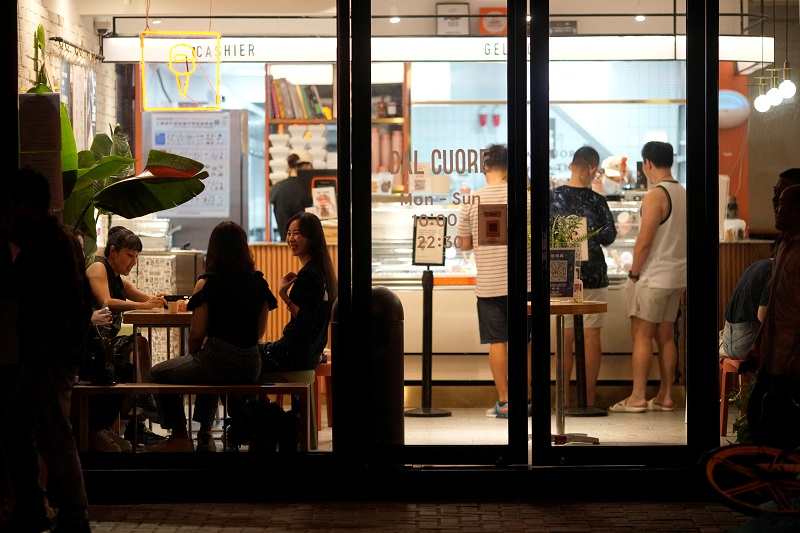
Customers eat ice cream at a Gelato Dal Cuore store in Shanghai, China, September 18, 2022.
14:01 JST, October 14, 2022
SHANGHAI,(Reuters) – Chinese consumers are typically known for lavish spending on high-end handbags, clothes and accessories that sustain Western luxury brands.
This year, however, economic ill winds have sapped much of their urge to splurge and it’s the littler luxuries in life – artisanal food and drinks as well as smart trendy appliances – that have caught their eye.
Brands that have jumped on the trend include Kweichow Moutai 600519.SS, best known for $300 bottles of baijiu, the Chinese spirit popular at banquets. It debuted baijiu-infused ice cream at $10 a cup in May, racking up 2.5 million yuan ($350,000) of sales on the first day.
Hong Kong-listed Budweiser Brewing Asia-Pacific 1876.HK, a unit of Anheuser-Busch InBev ABI.BR, notes that premium and craft beer as well as specially packaged gift boxes of beer priced at hundreds of dollars are selling unexpectedly well.
Sales of gaming gear and home devices from water-saving shower heads to smart toothbrushes to printers surged as much as four times last year’s levels during JD.com’s 9618.HK mid-year 618 shopping festival, data from the e-commerce giant showed.
Chinese consumers are “spoiling themselves with those little things and they’re loving something novel,” said Mark Tanner, founder of marketing agency China Skinny.
The shift in consumer trends, one that has seen some segments of the population go ultra-frugal, comes amid much economic gloom.
The country’s COVID-zero policy and its resulting frequent lockdowns have put the brakes on business activity and normal outlets for spending such as tourism. The property sector is also in crisis while the tech and private tutoring industries have sharply reined in hiring after regulatory crackdowns, contributing to a spike in youth unemployment.
The economy narrowly escaped contraction in the second quarter and retail sales grew a measly 0.5% in January to August from the same period a year earlier, a far cry from growth of around 8% to 9% seen in recent years.
Western luxury brands, in particular, are hurting. Burberry Group BRBY.L and French conglomerate Kering PRTP.PA, which houses brands such as Gucci and Yves Saint Laurent, both reported 35% year-on-year declines for China sales in the April-June quarter.
Lucy Lu, a 31-year-old Shanghai resident who works in marketing for a domestic fashion brand, says she is one of many consumers mending her ways.
“Before, let’s say with a handbag or cosmetics, if I liked it I would just buy it without a second thought, now I really double check with myself if I need something before I buy it.”
“Dining out is now my main treat,” Lu added.
For some artisanal food and drink sellers, this new shift in consumer behavior represents a perfect moment to expand.
Gerard Low, founder of Shanghai-based ice cream brand Dal Cuore where a scoop costs about 40 yuan ($5.60), plans to open a fifth store in the mega-city, encouraged by the quick return of footfall to normal levels after a draconian two-month lockdown was lifted earlier this year.
He also notes that more families, instead of mostly young people, are heading to his shops for a treat.
“When times aren’t so good, people want to feel better, guilty pleasures like ice cream can help,” said Low.
Top Articles in News Services
-

Survey Shows False Election Info Perceived as True
-

Hong Kong Ex-Publisher Jimmy Lai’s Sentence Raises International Outcry as China Defends It
-

Japan’s Nikkei Stock Average Touches 58,000 as Yen, Jgbs Rally on Election Fallout (UPDATE 1)
-

Japan’s Nikkei Stock Average Falls as US-Iran Tensions Unsettle Investors (UPDATE 1)
-

Trump Names Former Federal Reserve Governor Warsh as the Next Fed Chair, Replacing Powell
JN ACCESS RANKING
-

Producer Behind Pop Group XG Arrested for Cocaine Possession
-

Japan PM Takaichi’s Cabinet Resigns en Masse
-

Japan Institute to Use Domestic Commercial Optical Lattice Clock to Set Japan Standard Time
-

Man Infected with Measles Reportedly Dined at Restaurant in Tokyo Station
-

Israeli Ambassador to Japan Speaks about Japan’s Role in the Reconstruction of Gaza




















